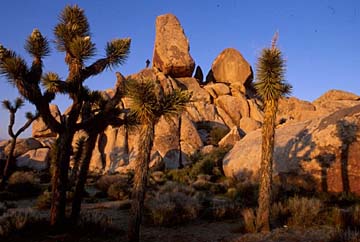The Winding Road to Joshua Tree
Travel Stories: She moved to Los Angeles, found herself in the midst of a personal monsoon and began skipping dinner parties. Then Deanne Stillman rearranged her life around trips to her new church: Joshua Tree National Park.
09.21.06 | 1:05 PM ET
 Photo by Galen Hunt.
Photo by Galen Hunt.Eighteen years ago, I set up camp in the golden West, joining the hundreds of migrant workers who made small fortunes by hauling what is now called content out of the television mines that, like Los Angeles itself, periodically cave in without warning. I was satisfied by neither work nor love, but the terrain began to comfort me in unexpected ways.
In Ohio, where I grew up, I never felt at home; I realized at an early age that I did not belong on the shores of a lake that was frozen most of the time, or in a city that always seemed to whisper discouraging nothings in my ear. I guess that’s why I always preferred the New York Yankees to the Cleveland Indians (although felt like a traitor for rooting for them before I moved to New York, the anti-desert, land of nonstop reaction), and why I used to send away for cactuses (I know you’re supposed to say “cacti,” but I don’t like the sound of it) that I could get from places with named like Kaktus Jack’s and Desert Botanicals and keep them on a window ledge near my bed. I don’t know if my window ledge faced west or not (the gray skies often obscured the sun), but seeing the outlines of my little cactuses against the clouds fueled my fantasies of the never-neverland where the turnpike went, the land where the misunderstood found understanding, the land where Zorro and Bat Masterson and Wyatt Earp wouldn’t let anyone hurt you, the land where a girl named Jane lives forever as a Calamity, the land where the only thing anyone or anything really wants is a drink of water.
Once in Los Angeles, I immediately had the sense that I had planted myself at the edge of a desert, and that I was indigenous and could flourish here. I liked the idea of sinking roots into this quicksilver garden, this false greenhouse watered by hijacked rivers and tended by gatekeepers anxious to keep the temple of fame from getting too crowded. Maybe it was the light; the light was different out here—things showed up better, looked more like themselves. Maybe it was the space. Maybe it was in the seamless stretch of sunny days; they were different too, a bright backdrop for a carnival of beautiful creatures who lived phototropic lives, predators who drifted in to drink at the oasis from regions where those who stay behind get old.
Or maybe it was that song in the background, coming from what I soon learned was Joshua Tree National Park, fading in and out, connecting me to some other world, the enchanting tinkle of chimes, from hidden patios up there behind the bougainvillea, rearranged by the Santa Ana winds that swept across the endless waves of sand outside the city, carrying good news.
The song first came and got me when I was on assignment for a local alternative newspaper, attending a workshop facilitated by “the shaman of Beverly Hills,” a well-known woman who had written a series of books about women and inward spiritual journeys involving power animals and other primal symbols. The workshop was at a banquet room in the airport Hyatt, down the hall from a meeting of the International Chiefs of Police, who presumably were power animals. Several hundred women were in attendance. After various introductory remarks, the lights were dimmed, candles were lit, and Native American flute and drumming tapes began. We were told we were going on a shamanic journey. (As an anthro major whenever I had bothered to, one, declare a major and, two, appear in class, I was not alarmed by this statement and in fact took it with some excitement.) “Close your eyes, get quiet, and visualize yourself going down a hole into the earth,” the workshop leader said. “Along the way, take in whatever crosses your path. I want you to follow this path, however it looks to you, to an altar. At that altar, I want you to find something you need from someone you know.”